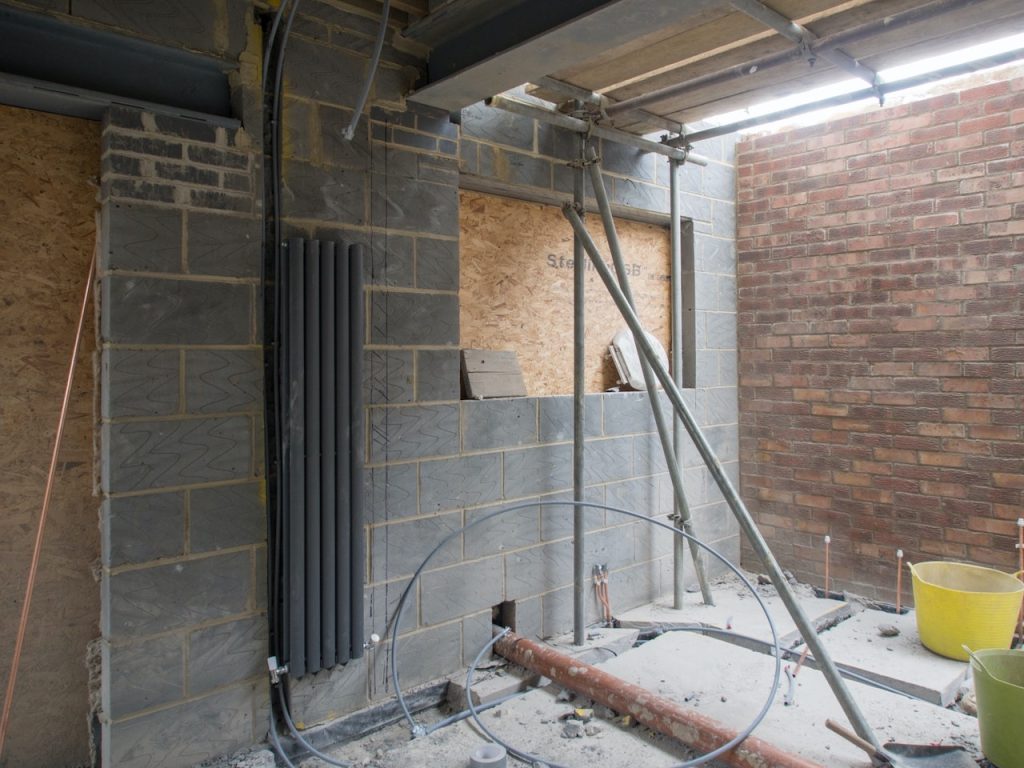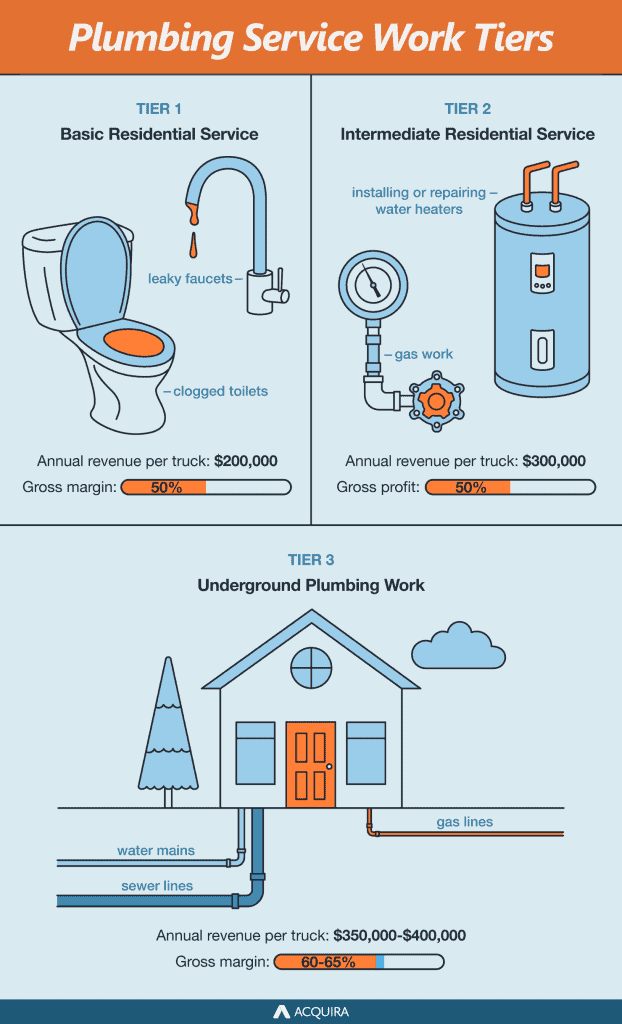- Why we don’t like new construction plumbing companies.
- How to reallocate resources to improve efficiencies in a plumbing business.
- How growing a business’s gross profit can increase its valuation.
- What things to look for when appraising a plumbing business.
Plumbing companies hold a special spot in society: They are intrinsically necessary for maintaining a certain quality of life for homes and businesses, and yet plumbing companies often get a bad rap.
We’re here to dispel the negative portion of that perception.
In fact, given that the majority of home and business owners are incapable of maintaining their own plumbing systems while they still need potable drinking water and a functioning sewage system, plumbing companies can make for a very good investment. The industry itself is relatively recession resilient because even during an economic downturn, people will opt to fix any plumbing issues.
Acquira has bought and run a number of plumbing businesses around the United States, and we have found them to be solid performers. But just like any potential acquisition, you need to know what to look for when appraising a plumbing company in order to determine whether it’s a good deal or not.
In this article, we’ll walk you through some of the most important considerations before buying a small business plumbing service and how to interpret the data. If you'd like to learn more about how Acquira can help you acquire and grow an existing plumbing company, simply fill out the form below.
Consideration #1: Does The Company Do New Residential Construction Jobs?

When a general plumbing contractor does construction work, that means they show up when a structure is in the process of being built to install water supply pipes, copper tubing, water boilers, drain pipes, and fixtures like sinks, faucets, or showerheads. Gross margins for this type of work are typically 15-30 percent.
One of the first things a potential buyer should ask about a plumbing company is whether they do construction jobs or not. If the answer is yes, then the multiple should be lower because that company’s business is now tied to the economy. New housing construction tends to decline in times of economic downturn. So if a recession hits, that plumbing company’s bottom line will likely suffer.
Consideration #2 – Does The Company Do Commercial Construction Jobs
Of course, not all construction is residential work. Some plumbing companies may do commercial construction. The gross margins on this work, like its residential counterpart, are 15-30 percent. These jobs are much larger and, therefore, riskier. The company also requires much more moving parts:
- You need an estimating process
- You need a strong project management process
- You have a finance department that needs to collect and report accurately on backlog.
For all of these reasons, it’s possible to lose a lot of money if a single job doesn’t go well. It's also why we no longer buy commercial construction businesses. While we own some businesses that meet this description, we aren't looking to buy more.
Does The Company Do Service Work?
In the plumbing world, service work involves repair or alterations that take place after a home has already been built. This type of work runs the gamut, from sewer and water line repair to plumbing repair and leak detection.
At Acquira, we break service work into three different tiers:
Tier 1:
Basic residential service consists of issues like clogged toilets and leaky faucets. Generally, it takes very little training to do this type of work.
You could take a relatively handy person with limited plumbing experience, have them ride-along with a plumber and within a few months they could probably have their own truck exclusively working on these basic tasks,” explains Acquira CEO Hayden Miyamoto.
The yearly revenue per truck for this type of work is typically around $200,000 with a 50 percent gross margin.
Tier 2:
Intermediate residential service involves more intensive tasks that include gas work and installing or repairing water heaters. The annual revenue per truck for this type of work is around $300,000, and gross profit is approximately 50 percent. The plumbers with the required skill set for this work typically have at least three years of experience.
Tier 3:
Underground plumbing work includes jobs on sewer lines, water mains, and gas lines. This can be commercial or residential. A typical plumber can take years to get to this skill level, though it can be possible to hire plumbers who already have a background working in new construction jobs to do this work.
At this level, trucks usually bring in between $350,000 and $400,000 each. Importantly, at this level, gross margin tends to increase to between 60 and 65 percent simply because there are far fewer companies doing this type of work. As a result, at this tier, you’re making significantly more profit.

| Note: Remember that all markets are different. You will need to take things like demographics, total addressable market, and more into consideration when analyzing a business. We’ll get into all of that further down this article. |
Using The Tiers
The reason that these tiers are so important is that you – as the buyer – need to understand the business’ capacity for each tier:
- You need to know what each of their plumbers is capable of;
- You need to understand how much latent demand currently exists at the business today for each type of work; and
- You need to know how much capacity and availability the business has to meet that demand.
In general, a plumber’s career progression will take them through each of the three tiers, beginning with basic residential service for a few years before moving on to intermediate residential service. They will spend a few additional years there before moving up to advanced residential service.
Sometimes you’ll find a business (like we have in the past) where you can simply remove plumbers from the basic residential service work and have them concentrate on the higher-margin Tier 3 work.
While analyzing any plumbing business for potential acquisition, you should try to see if there is a way to allocate resources better and put high-capability workers onto high-margin work.
How A Growth In Gross Margins Increases EBITDA
This shifting of resources can have a huge impact on the valuation of a business.
This shifting of resources can have a huge impact on the valuation of a business. For example, if there are three plumbers capable of doing Tier 3 work that can bring in $250,000 in annual gross profit, but they’re working primarily on residential new construction jobs that bring in $50,000 in annual gross profit, that’s $600,000 worth of gross profit that the business isn’t seeing.
Many business owners see this as revenue because they haven't truly analyzed the margins in each of their jobs. That leaves them focused primarily on revenue and just keeping their guys busy.
One of the primary reasons that this can impact a business’ valuation is because, almost always, operating expenses will be fixed.
To break it down, let’s imagine a company that is making $4 million in revenue each year. Of that, the company makes $2 million in gross profit and has $1 million in overhead. That means the company is making $1 million in profit.
If If you were to grow the gross profit by 20 percent by simply shifting around the type of work you prioritize, your overhead likely wouldn’t grow with it. So now your gross profit is $2.4 million, but your operating expenses remain the same. That means you now have $1.4 million in profit. A 40 percent growth to your bottom line.
So you’ve now increased your EBITDA (Earnings Before Interest, Taxes, Depreciation, and Amortization) by 40 percent. And since companies are normally appraised by a multiple of their EBITDA, you’ve just increased the value of your company simply by allocating resources in a more efficient way.
Commercial Service Opportunities

“I prefer commercial service, personally,” says Hayden. “Commercial Service can come in the form of maintenance contracts, where customers are typically property managers or facility managers. You basically come in, typically quarterly or sometimes semi-annually, and inspect everything. It's guaranteed income, and it's a good profit margin.”
Profit margins are actually slightly lower, around 35 to 40 percent, but as Hayden explains, your customers are now captive clients.
“With these contracts, you are paid to come in and inspect and perform maintenance on equipment. Any issue you find that requires replacement or service, you're paid separately for, typically at a 50%+ gross margin.”
If the company doesn’t already have a commercial service business line, it can be a great investment to build one out. Again, you should consider the capacity of the plumbers already working at the company, but commercial service work is often less intensive work. For business owners that are interested in growing their businesses in this manner, we recommend our ACE Framework. The Framework is a post-acquisition change management system designed to help grow a business for an eventual exit. If you'd like to learn more, schedule a call with us through the form below.
Other Considerations
While the above tiers provide an effective way to look at a company and quickly determine whether the business can be grown easily, they aren't the only things that should be considered when looking at a potential plumbing company acquisition. Below is a list of additional considerations that you should always have in the back of your mind when looking into a business.
Assets
Be sure to look at what percentage of the purchase price is represented by assets. Construction plumbers will often have large pieces of machinery like backhoes or mobile elevating work platforms (AKA “cherry pickers”).
Some companies offer a service called hydro jetting, which is often used to clean drains in restaurants. In most markets, you can charge around $300 for the jetting, and this relatively simple work takes a total of one hour to complete. This type of work is asset-heavy, but the earning potential is immense.
Other Business Lines
We discussed above how to turn commercial service contracts into a new business line, but you should be aware of other opportunities to create revenue. For example, the Phoenix area has very hard water, so water treatment is a high-margin business in that region.
In other areas, water boilers are common, and work on them involves an amalgam of plumbing and HVAC work. Those companies may offer the potential for their plumbers to do HVAC work. In that case, you would want to check to see if any of the plumbers carry an HVAC license.
Licensing
Speaking of licensing, most states require plumbers to have a license. While appraising any plumbing business, you should confirm that all of the workers have the required credentials.
Bidding
Look into who does the bidding for jobs and how the process is done. Do the plumbers know how to make bids? Is there a price book, and is it updated regularly? Does the bidding process need to go through the manager or the owner?
If a home or business owner asks for a quote, a plumbing professional should be ready to offer them an accurate and honest estimate of how much the work will cost. That can include everything from unclogging a toilet to replacing a water heater or fixing a link in their water main.
Operations Sophistication
Check to see whether the company has created job descriptions for its employees. Moreover, you want to see if employees have metrics that they’re aware of and working toward.
Is the business run to a financial statement forecast, and are Standard Operating Procedures (SOPs) written out and communicated to everyone? This may include the steps on how to communicate with customers requesting a water heater replacement, or it could include the required steps to replace broken underground piping.
Each of the above items indicates a level of operations sophistication. If the business you’re appraising doesn’t have any of the above items, it may mean there is an opportunity to make improvements and increase efficiencies. Just be aware that introducing these types of changes often comes with a cost.
Technological Sophistication
What technology (if any) does the company use? That may include technology platforms like ServiceTitan, inventory software, or payment/billing software.
Moreover, how do they manage inventory in their trucks? Is the inventory vendor-managed, meaning someone comes and restocks the trucks for them? Or do the plumbers have to manage the inventory on the trucks themselves?
Demographics
When looking at a business, you must be aware of the local demographics. A good question to ask yourself is, “Is there potential to more than 10x the business within its surface area within 10 years while staying under 20 percent market share?”
So, looking at the next ten years, you should take into consideration a combination of demographic So, looking at the next ten years, you should take into consideration a combination of demographic projections (ie: how many people will be moving into the area) and the existing market size. Then estimate the company's market share by dividing the total serviced households in a given period by the total number of serviceable households.
For example, if you live in a city that has 100,000 households and you’re already servicing 10 percent of them in a given year, it is not possible to increase your market share ten times over and stay under 20 percent market share. We believe it’s important to stay under 20 percent market share simply because you will always have existing competitors or new competitors entering the market. You want to be sure that, even if you’re the number two player in a given region, you can still grow the company by 10x through efficient marketing and doing your job well.
This portion of the calculation often eliminates plumbing companies in smaller cities, unless those cities are projected to have a population boom within a decade of your purchase of the business.
Acquira provides an entire thesis calculator as part of our Accelerator Program that lets you score each of these and teaches you how to do diligence and score them across multiple industries including plumbing. If you'd like to learn more about our training, simply fill out the form below.
More Things To Look At
Company Culture: Businesses with existing company culture almost always perform better than companies without a strong culture.
Brand Moat: This is when customers pay more for something specifically because of the brand. This can be identified by looking at whether people pay more for an item because it comes from a specific company. A good brand moat indicates a strong reputation in the community and is likely a sign of high customer loyalty.
Seasonality: The business should not have low seasons.
Recession Resiliency: The business should be able to remain successful even in times of economic downturn. This trait is true of most home services businesses.
Management Depth: Does the business already have a service manager, sales manager, and office manager in place? If it does, that's a check in the “pro” column for that business. Having this level of management removes the risk of change impacting the business. It also removes the potential cost of having to find, hire, onboard, and train these individuals if the business doesn’t have them on staff already.
Conclusion
Plumbing is not only good, honest work. It’s also a great investment.
Most home and business owners simply don’t know how to manage or maintain their own plumbing systems. But everyone needs drinkable water and a place to go to the bathroom.
Whether you’re able to improve the business by reallocating resources or building out a commercial services offering, there are myriad ways to grow and improve a plumbing business to make it more profitable.
Acquira has acquired and run a number of plumbing businesses in the country and we will continue to do so. If you’re interested in how we can help you acquire a plumbing company yourself, schedule a call to speak with one of our representatives through the form below and someone will be in touch within 24 hours.
Do you have any funny plumbing stories you’d like to share? We’d love to hear about them in the comments below. If you’re interested in making use of our training and calculators, that can all be found through our Acceleration+ Program, which you can sign up for in the form below.
Key Takeaways
- By simply prioritizing tier 3, advanced residential plumbing work, you can increase your gross profit and the valuation of your business.
- Commercial service contracts are a great opportunity for any plumbing business.
- Be aware of other potential business lines when looking at any company.
- Even if you’re the number two player in a region, you want to be sure you can still grow the company by at least 10x
- Professional plumbers should know how to make estimates and bids on jobs.
Acquira specializes in seamless business succession and acquisition. We guide entrepreneurs in acquiring businesses and investing in their growth and success. Our focus is on creating a lasting, positive impact for owners, employees, and the community through each transition.



